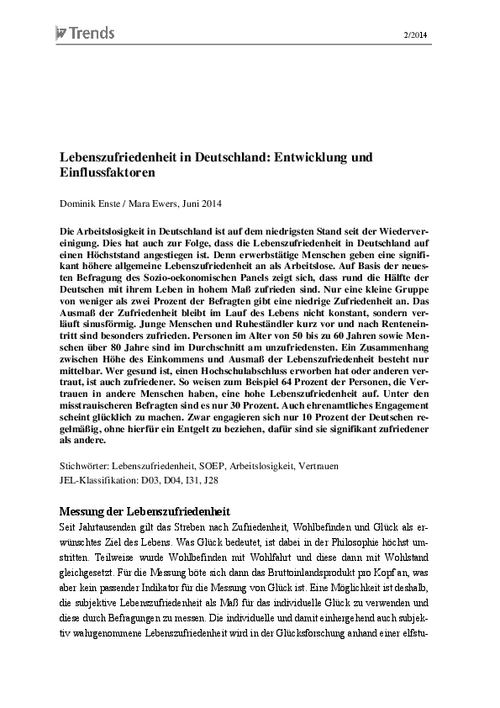Development and Influencing Factors

Life Satisfaction in Germany
IW-Trends

Development and Influencing Factors
Unemployment in Germany is at its lowest level since reunification in 1990. One consequence of this is that life satisfaction in Germany has risen to an all-time high. In general the employed count themselves significantly more satisfied with life than the jobless. According to the latest wave of the Socio-Economic Panel half of all Germans are largely satisfied with their lives. Only a small group, fewer than two per cent of respondees, reported low satisfaction. Rather than remaining constant over the course of our lives, our degree of life satisfaction tends to describe a sinus curve. Young people and newly retired pensioners are particularly content. On average, those aged between 50 and 60 and men over 80 years of age are the most dissatisfied. Levels of income and satisfaction with life are only indirectly linked. Enjoying good health, having a university degree and being of a trusting nature also contribute to greater contentment. For example, 64 per cent of those who rely on others’ good faith report a high degree of life satisfaction, a level reached by only 30 per cent of the less trusting. Voluntary work also seems to bring happiness. Although only a tenth of all Germans do honorary charitable work on a regular basis, these ten percent are significantly more content than the others.

Dominik Enste / Mara Ewers: Lebenszufriedenheit in Deutschland – Entwicklung und Einflussfaktoren
IW-Trends

More on the topic

Leadership in transformation: Megatrends and management as a driver of change
Leadership dynamics in companies are subject to constant change in order to meet the challenges of their time. Today, the greatest influences result from developments such as demographic change, globalization, individualization, structural change and ...
IW
Green Nudging – a key against littering?
The demand for cleanliness in cities is increasing: "Littering" - the illegal littering of public spaces - does not only cause costs for the environment and society, but also has significant financial consequences through increased cleaning costs.
IW